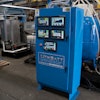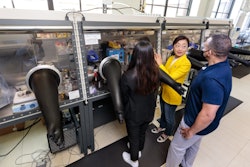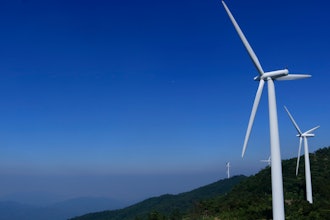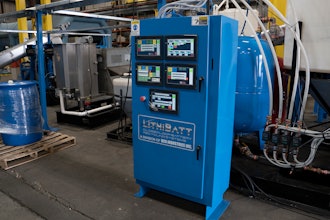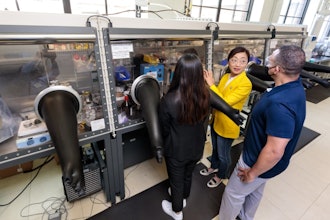We talk to Heath Ralphson, Head of QHSE, Aggreko, about the advantages, challenges and solutions of implementing a solid QHSE programme on an international basis.
Operating in a hazardous or high-pressured environment can mean anything from working in intense temperatures, during extreme weather conditions, in an offshore environment, deep underground or in remote, hard to reach locations.
Quality, Health, Safety and Environment (QHSE) programs are vital to the successful running of any international company, especially companies like Aggreko who install and operate electrical generation and distribution equipment in diverse and often remote environments, sometimes lacking the most basic infrastructure. Without strong and comprehensive QHSE systems in place, companies could be exposed to incidents that could put their people and the environment, in danger. Implementing a strong QHSE practise can be further complicated by the differing regulatory and compliance standards that exist within certain companies, countries and across the various industry sectors. Therefore, finding a common standard that ultimately ensures the safety of all and reduces the potential impact to the environment can be considered by some as a time-consuming and expensive problem.
While trying to standardise QHSE systems across an international workforce can be problematic, it is not impossible. Head of QHSE for Aggreko, Heath Ralphson is charged with ensuring the company’s 5,700 staff located across the 194 service centres, are all aligned and correctly following the company’s stringent QHSE policies. He commented, “Successful programmes lead to a more streamlined and effective system in terms of time and cost. A successful QHSE system is one that can be applied cross-culturally, in several different languages and in markets which are not accustomed to applying strict QHSE principles.”
A key outcome of a successful QHSE program is the provision of suitable guidance and controls to manage all associated risks no matter the location, resulting in safe operations and zero injuries.
A strong QHSE program must be driven by the management team, with ownership and a suitable level of authority given to the workforce so that they can feel the benefit to themselves and affect the benefit to the business while taking pride in it. QHSE must become a way of life.
There is the added complexity of working with market sectors, each with specific QHSE requirements – oil and gas, mining, construction, shipping and events to name but a few – which command an additional level of understanding. Organisations must take the necessary steps to ensure that the key messages are conveyed seamlessly and that the vital procedures that must be followed are understood, no matter where in the world they are being implemented.
One system
A standardised QHSE programme is vital to companies that work across a number of markets with partners of different size or levels. It also ensures that no matter of a person’s history or location, all employees understand the same control measures and work safely, all of the time.
A strong QHSE offering is one of the leading factors when selecting a third party supplier. Contracting companies must assess third parties on their ability to manage the potential risks associated with their activities, ensuring that suitable QHSE programmes are in place – protecting their employees, the environment, their reputation and value.
With such a robust model, there is little need to adapt for different jobs as the standard ensures that all procedures and eventualities are already covered. However, a good QHSE program will always allow room for growth and change as the industry and its needs evolve.
The challenge of language
Working across a variety of countries can sometimes present an issue of misunderstanding. Language barriers can and do cause problems and must be broken down in order to implement a full QHSE program.
Ensuring that all employees understand the language of the QHSE message is vital to the success of any project and provides the employee with the knowledge they need to keep themselves safe on the job.
Heath explains, “We approach this local problem with a set of international solutions that can be used throughout the world. Technology plays a key role in facilitating a more seamless communication system, where content can be translated and pushed out in real time. The company also takes great care to ensure that all necessary hazard warnings on site are in the dialect of that location, to ensure all site employees or visitors are aware of the most immediate and fundamental health and safety control measures.”
Ownership
Good QHSE management helps to take a company from being a good, small company to a great, big company. The commitment and support of all staff including the senior team cannot be underestimated.
Everyone is affected by QHSE – staff, clients, site visitors and the general public. Heath commented, “QHSE is a way of life at Aggreko. Late in 2012, our Jebel Ali service centre in Dubai UAE, reached an important milestone of 1,000 days without lost time incidents – a great feat considering there are around 500 shop floor staff in that location alone.” Aside from achieving record successes internally, the company is also well recognised by its customers as a champion of QHSE. It was such dedication to QHSE that recently saw a key precious and base metal mine, Bisha in Eritrea, recognise Aggreko with an award for its consistently high standards in their upkeep of the rental equipment on site.
QHSE — A way of life
QHSE programs are not just an optional extra. They’re the backbone of any successful firm and one of the reasons behind its business success. Whatever the cost and commitment of implementing a successful plan, it is worth it for an accident-free, safe, informed workforce. The philosophy followed by Aggreko is ‘Safety for life’ – a guiding principle that appears on the company’s PPE apparel and defines the culture which makes companies like Aggreko so unique in a complex and ever expanding global environment.
Aggreko plc is the world leader in the supply of temporary power and temperature control solutions. Aggreko employs over 5,700 people operating from 194 locations. In 2012 we served customers in about 100 countries, and had revenues of approximately GBP 1.6bn (USD 2.5bn or Euros 2.0bn). Aggreko plc is listed on the London Stock Exchange (AGK.L), is a member of the FTSE-100 index, and is headquartered in Scotland. For more information, please visit the company website at www.aggreko.com.


